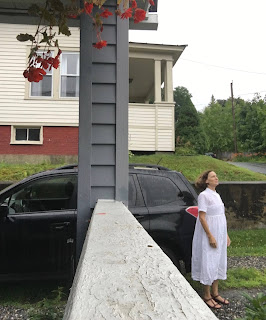I did take a quick snap of this woman standing on Corso Magenta and wearing a simple white dress and flat shoes that seemed both elegant and cool for this weather.
I almost became obsessed with that dress, its simplicity superimposed on a young, sophisticated, perhaps even hip (the tattoo) young woman, her long straight reddish hair softly draped over her left shoulder.
I don't normally wear white. If I do, it's usually a blouse or a tee-shirt, but the thought of sitting down with white fabric coming into contact with a chair or grass or dirt makes me anxious. I am too messy a person to wear white. I will inevitably spill something and make a stain that won't wash out. But, just as I had acquired the Florentine colors of ochre and lime green, I had to acquire the long white cotton dress of Milan. Madewell had one that was very similar to the one I saw on Corso Magenta, on sale on their web site, and I ordered it in medium, hoping that it would fall loosely, away from the body, just like the original Italian one.
I don't know if I will ever wear it, unless I bring it with me on a future trip to Milan. Which leads me to the question of wearing clothes out of context. I believe that clothes still have a context despite globalisation (like, the Madewell dress purchased in the US but that evokes the dress I saw on the streets of Milan).
Another dress, this one found at a vintage flea market in Seattle a few years back, made perfect sense when I wore it on the porch of our airbnb, in the middle of summer, surrounded by lush Northwestern vegetation. But, when I wear that same dress, presumably from Hawaii, hand made, in the 1960s or 70s (this vintage web site had a similar one) at home in New England, even on the hottest of the hottest days, it feels like a costume, it feels...kitsch.
In his fascinating, incredibly well researched book, Fashion and Orientalism, Adam Geczy argues that clothes, textiles, patterns, accessories, from countries outside of Europe as worn by Europeans in Europe could evoke either a conservatism associated with colonial and imperial conquest or a rebellion against conventional bourgeois norms.
In which category do I fall? In this particular case, I am wearing clothes purchased in one part of the western world in another part of the western world, not exactly a big act of rebellion or conquest. But each city has a certain uniform, and rural New England is even more homogeneous. Wearing a dress as opposed to shorts and a tee-shirt can attract attention. I don't like being gazed at, which seems paradoxical given my love of clothes and assembling interesting outfits to reflect my mood and my memories of recent travels to elsewhere. I guess my decontextualization of dress makes a statement that I would rather still be there rather than here, or, wishing that "here" and "there" could co-exist. Clothes can achieve that. I just have to learn to handle the gaze.






No comments:
Post a Comment